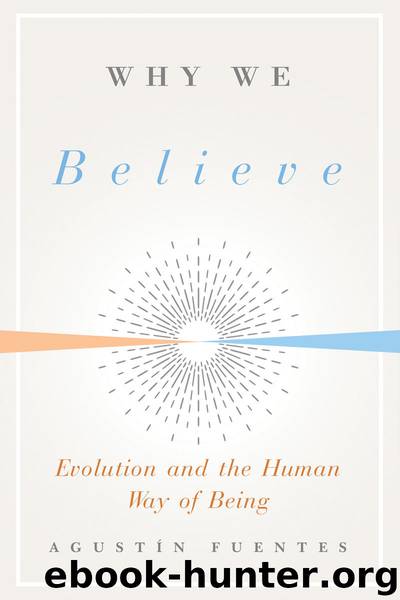Why We Believe Evolution and the Human Way of Being by Agustin Fuentes

Author:Agustin Fuentes [Fuentes, Agustin]
Language: eng
Format: epub
Publisher: Yale University Press
Published: 2019-09-24T06:00:00+00:00
CHAPTER 9
Economies
MANY PEOPLE believe contemporary economies emerged as a necessary reality of the world.1 This is at least partially wrong.
Nearly all humans participate in some form of an economy—an organized system of activity involving the production, consumption, exchange, and distribution of goods and services.2 We often work to earn compensation and then use that compensation to purchase items and goods that are not the direct products of our labor, such as food, housing, or transportation. If we don’t have money or credit, we can try to trade some form of labor for a good, such as fixing someone’s roof in exchange for food. If we have some goods but need others we can also barter, exchanging our goods for other goods.
Today, the distribution of wealth in economies is rarely equitable, especially in market economies, the dominant form of contemporary economy. In the first quarter of the twenty-first century, a tiny percentage of the more than 7.5 billion humans on the planet control the vast majority of wealth in the global economy and in almost all local and regional economies.3 If contemporary economic systems are so inequitable, why are they the dominant pattern for human societies today?
In part, because of belief.4
A wide swath of humanity believes that economies, especially market economies, are natural phenomena, like language capacity, complex neurobiology, and the use of symbols—universal and inevitable outcomes of being human. Across many societies5 there is a shared belief that every benefit has a cost, that there is no “free lunch,” and that making a profit, making a “good trade” and “coming out ahead” are not just what everyone seeks but are reflections of the natural pattern of life. In short, many people believe the world is a system in which competition for limited resources is very close to a natural law. The astute assessing of the costs and benefits, and an eye for greater overall benefit from economic exchanges, makes one a winner in the game of life. This belief in the “naturalness” of economic processes includes the assumption that humans have a natural drive to negotiate, to exchange, and to barter. It presumes that humans are economic actors and that market economic systems are therefore the natural outcome of our evolutionary trajectory.
It turns out, however, that most humans do not behave like rational economic actors. We willingly accept losses as often as gains in exchanges. The reason is that for the majority of humans, exchanges are not about profit but about making and keeping social connections. The relationships at the center of human social lives are not driven by an urge to obtain equal or better benefit in interactions. Think about the relationships between mothers, fathers, and children; between loved ones and best friends; or even about your “investments” and “returns” in your dog or cat. What you give, get, and share in these interactions cannot be quantified or monetized. There is much more to human social lives than can be modeled in economic cost/benefit calculations. And we are not alone.
Download
This site does not store any files on its server. We only index and link to content provided by other sites. Please contact the content providers to delete copyright contents if any and email us, we'll remove relevant links or contents immediately.
| Cell Biology | Developmental Biology |
| Entomology | Marine Biology |
| Microbiology | Molecular Biology |
| Biostatistics |
Sapiens: A Brief History of Humankind by Yuval Noah Harari(14370)
The Tidewater Tales by John Barth(12653)
Mastermind: How to Think Like Sherlock Holmes by Maria Konnikova(7323)
Do No Harm Stories of Life, Death and Brain Surgery by Henry Marsh(6938)
The Thirst by Nesbo Jo(6932)
Why We Sleep: Unlocking the Power of Sleep and Dreams by Matthew Walker(6706)
Life 3.0: Being Human in the Age of Artificial Intelligence by Tegmark Max(5549)
Sapiens by Yuval Noah Harari(5366)
The Body: A Guide for Occupants by Bill Bryson(5082)
The Longevity Diet by Valter Longo(5058)
The Rules Do Not Apply by Ariel Levy(4957)
The Immortal Life of Henrietta Lacks by Rebecca Skloot(4581)
Animal Frequency by Melissa Alvarez(4462)
Why We Sleep by Matthew Walker(4435)
The Hacking of the American Mind by Robert H. Lustig(4375)
Yoga Anatomy by Kaminoff Leslie(4358)
All Creatures Great and Small by James Herriot(4311)
Double Down (Diary of a Wimpy Kid Book 11) by Jeff Kinney(4261)
Embedded Programming with Modern C++ Cookbook by Igor Viarheichyk(4173)
